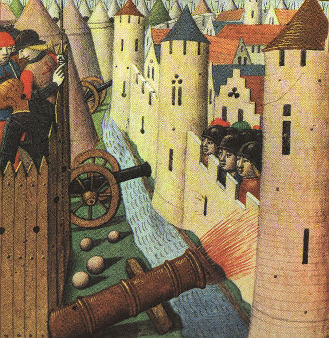|
|
|
|
|
||||||
|
|
||||||
| THE FRENCH RESURGENCE (1429 – 53) | ||||||
|
||||||
|
| HOME | |
 |
During 1428 the English
launched an attack on Orleans. The
force was to small to invest Orleans fully, but for seven months the
French were passive, despite the withdrawal of the English allies,
Burgundy. The turning point
was the intervention of Joan of Arc, a peasant girl from eastern France,
who inspired the French forces. The
siege was lifted and was followed by the capture of the English held
bridges over the Loire and the rout at Patay (June 18 1429) of the only
English field army in France. The
French revival undermined the English position; despite Joans capture and
her execution in 1431. The
French noose tightened around Paris, raiders penetrated Normandy, and
resistance to English occupation increased.
In 1435, the course of the war changed decisively, the death of one of Englands most respected commanders was followed by Burgundy’s defection. This desertion left the English with a longer frontier to defend. By the end of 1435 the French had overrun eastern Normandy. In the next year Paris was lost and Calais was besieged. However, by 1442, the English had recovered most of eastern Normandy in small-scale sieges, which was dictated by their growing financial crisis |
|
The English weakness was becoming increasingly apparent: French ships operated from Dieppe made the Channel unsafe in the absence of Henry V’s navy; and the French kings (Charles VII) Gascon campaign (1442) further taxed scarce English resources. The next ten years saw English strength decline, the government was struggling to raise armies and then to transport what they had raised. Normandy’s fate was decided by the exhaustion of English resources and by French siege artillery. The English garrisons in Bayeux and Caen surrendered after two weeks of bombardment to a vastly greater force. The last important English fortress Cherboug, surrendered on August 12 1450. Meanwhile Charles lieutentant in the south-west subdued the region around Bayonne, they captured Bergerac in the Autumn. French, Breton, and Castilian ships blocked Bordeaux, the key fortresses nearby fell: Bourg and Blaye without a fight, and Fronsac after heavy bombardment. On June 29 Bordeaux surrendered, followed by Bayonne on August 22. The relief forces, which England had organized for 10 months, never sailed. The indifference to the governments attempt to raise help and the loss of English possessions in France, in retrospect, meant the 100 years War was over. |
|